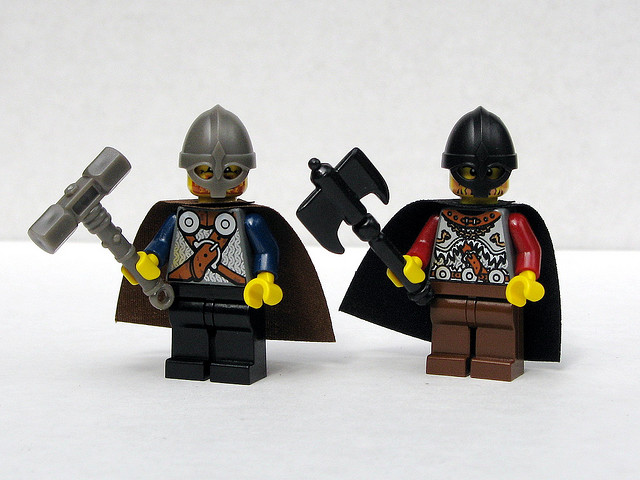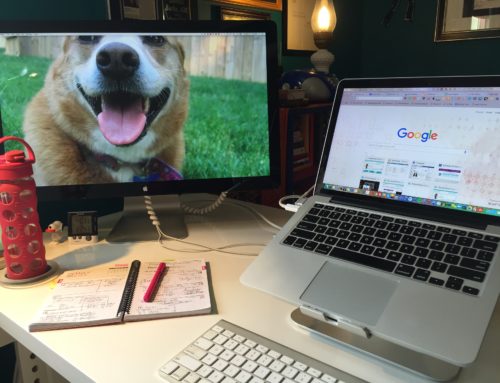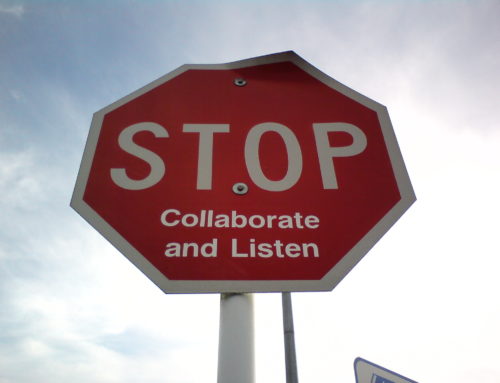 Some of you know I’m adjunct faculty at Johns Hopkins University. For those who don’t, I am (!), and this is my fourth year teaching a class on “not-for-profits in the digital age.”
Some of you know I’m adjunct faculty at Johns Hopkins University. For those who don’t, I am (!), and this is my fourth year teaching a class on “not-for-profits in the digital age.”
Not so long ago, one of them asked me a question that I thought would make for a good blog post:
How do you avoid stepping on the toes of your client, so that they don’t think you’re trying to show them you’re smarter than they are?
Ah, the client-consultant ego clash. I’ve encountered it, and I imagine you have as well.
The irony is that clients often hire us because they think we’re smarter, or more experienced, than they are, at least in the specific area that they need help in … but then the ego kicks in. And they, or we, feel that they, or we, are always right.
How do we get around this? Here’s what I”ve learned:
1. How you ask the question makes all the difference
Let’s say the client wants to do something you don’t feel is right for this particular project or campaign. It could be anything, focus on a particular social network at the possible detriment of others, or … you fill in the blanks, I bet you can!
I’ve found that instead of saying an outright “no,” asking them “why” can make all the difference.
I try to phrase questions/responses so that they don’t come across as antagonistic. For example, if I say, “That’s a very interesting idea, can you tell me how that will work?”
as opposed to
“That won’t work,”
I come across as acknowledging their opinion and willing to work with them. And there’s no harm in praising them … e.g. “That’s a terrific idea” – after all, a little ego massage rarely hurt anyone.
And particularly if you ask them to think through the actual steps in implementing this, including staffing, logistics, and so on, you’re helping them come back to reality and focus on what can work.
2. Bringing it back to business objectives
Second, try as much as possible to bring the proposed action back to their overall objectives.
If I say, “That’s really interesting, can you show me how that will work to do <whatever they’re trying to do, raise money, etc.>?” then I’m bringing it back to the end results, and what is in the best interests of the organization.
This is also a really good way to help clients who are a little too focused on the nitty gritty of tactics (especially tactics they’re in love with) to take a step back and think strategically. Heck, it helps us take a step back and think strategically.
And rarely will anyone argue with that, especially if they realize (with your help, even if they don’t realize you helped them to do so) that what they’re suggesting just won’t help support the organization from the big picture point of view.
3. Breathe
This could apply in so many situations, but particularly if you have a knee-jerk reaction, take a deep breath.
There is absolutely nothing wrong with taking a while to think about what they’re suggesting, unless it’s a crisis situation. Personally, I think we can be too quick to respond sometimes, thanks to Blackberries and iPhones.
Give it a while, think about it, and reply to them within one business day. Give a thoughtful response and they will appreciate it.
I’ve also found that giving myself time to breathe, and think the client’s suggestion through, makes me put my own ego aside and think of what is overall in their best interests. Maybe this idea of theirs will work, if I can help them connect the dots.
And then I don’t have to be the bad guy (or girl) … and our egos live to see another day.
That’s what I’ve learned so far. How do you deal with the client-consultant ego clash? Do you have any other tips or ideas to share? Please do!
Image: Dunechaser via Flickr, CC 2.0







@Rathanuday Quite useful rathna! Thanks for sharing. Please do share it with the team as well. There should be no place for #ego in life
@ichibanraj Thanks sir:-)
@s_sivakumar @keerthi_ak @chitrachaudhuri @gautamghosh Thanks so much! Sorry it took so long to get back to you.
@soulati Thank you!
@jamiecrager @mmangen @iggypintado Many thanks for sharing!
@shonali You’re very welcome! :)
Great post, Shonali. It truly is in the wording…I honed my skills as an enlisted airman with (then) two degrees working with officers who had, usually, one. Learned to say “you’re a freaking idiot” in the politest, gentlest voice ever witnessed!
Seriously, though, it is a battle of egos ultimately. You have to remind yourself that the client is the “servee” and you are the “server.” I like your rephrasing of suggestions to focus on results…that’s why we’re hired in the first place…to facilitate delivery of results.
Just keep a stress ball in your briefcase, and you’re good to go!
@KirkHazlett I can’t imagine you saying “You’re a freaking idiot” to anyone! You’re way too nice. Good tip on the stress ball, Kirk… I have one on my desk, as a matter of fact… ha!
@rachaelseda @danielnewmanuv @shakirahdawud @texrat Thank you so much for sharing!
@shonali sure, good write-up
@kathikruse @sandrasays @harrisonpainter Thanks so much for sharing!
Great advice as always, and I think taking the time to think it over is important. Sometimes it’s when you step away from the work – you are off cooking or working out and somehow an idea comes to you that helps you connect the dots!
At the end of the day, it’s just being able to work with all different personalities, some will be more difficult then others. I think if you remember you were hired to help them succeed and you yourself don’t have an ego, slowly they will see that there’s no need for an ego war at all.
@rachaelseda Cooking, definitely! Working out… not so much, I have too much fun while I’m doing that, LOL.
The personalities do make a big difference. Sometimes the egos are too big to surmount it, though. I once had a client where this one person on the team, even though he was not directly supposed to be managing me (as the consultant) or the PR aspect of the project, inserted himself into everything. He rubbed his internal colleagues the wrong way, but for some reason, they’d never speak up to him. I managed to finish out that contract, but I vowed never to work with him again. Sad, because it was a good client!
@rachaelseda Great reminder. My best ideas come to me when I am running. I sooo want to be a quick reply, but I know it’s not always wise. Great post, Shonali. Just posted it on my LinkedIn.
@Cathie Ericson1 That’s so cool, thank you! @rachaelseda
So true…while I always want to be a “quick responder” I find that my response after I’ve thought over all the angles is so much more measured and spot on. I really mull things over when I run, like you said.
Great post; I shared it with my LinkedIn groups.
Great topic Shonali!
One big problem is everyone is an expert. So while the client comes to you for your expertise they talk with other people who are ‘experts’. This is a big thing with social media. I find a lot of odd people telling me they are experts.
But the key is how to handle this. I am often really quick to look at something and respond back that is doesn’t work and then have a back and forth on why vs having the reasons up front. Something I am working on. But research is really key when presenting responses because I do this a lot so that I can offer my own experiences, previous client experiences, and what is available out there for reference.
I really like how you advise to let them present their side first on the topic.
@HowieSPM Oh my goodness, I have encountered that SO often! “I was talking to so-and-so, who’s an expert in…” – this actually happened when I was at a job (so in-house), and I was specifically hired because they thought I *was* the expert. When I heard that, I felt like saying, “Um, you hired me, didn’t you? Why don’t you at least listen to what I’m saying?!”
Research is a great thing to do, especially if you are anticipating argument, sorry, discussion. :p I find that it’s really helpful if one researches similar organizations, campaigns, etc., and then presents those, because clients are more likely to take them seriously, since they’re in the same territory, as it were.
I’m trying to work on the first tip you mention myself, both personally and professionally. Turning negatives into positives, basically. I’m always concerned about misleading clients and promising more than what we can deliver, though. The challenge is to manage clients’ expectations in a way that sets a positive tone and lets them talk through their idea, but if the idea really isn’t right, making sure they don’t come away thinking we’re totally on board with it.
I also think it’s important to listen to our clients’ insights. While we as consultants may have been hired because we have certain expertise that the client doesn’t necessarily have, we have to realize that they know more about their customers/members/supporters than we do. Their insight is worth its weight in gold, and we need to take the time to listen to them rather than assume we know everything we need to know.
@karirippetoe That’s very true; under-promising and over-delivering is a much safer (and smarter) way to go about it, IMHO. That’s something I’ve really learned; while I don’t shy away from risks (I mean, I work independently!), I also have a very active left brain thing going on, where I think through as many steps as I can before committing to something, evaluating something, etc. – maybe it’s my Economics background! And managing client expectations is a huge part of working successfully with them, isn’t it?
Great advice. Definitely try to do these, but need to keep them in mind.
@KenMueller I imagine you do, from what I know of you. The one thing I don’t think you are is a hot-head… lucky you!
Excellent lessons here, Shonali. I’ve encountered many of these scenarios (who hasn’t, right?) and find that #3 works like a champ most of the time. Just pushing pause and recognizing that it really isn’t do or die or the end of the world if the client doesn’t get a response to their 15th email right away :).
I’m also personally working on #1 and rather than flat out saying “uh, no” when they show me something ‘perfect’ for the situation, I ask “how did you come to this conclusion” or “wow, that’s really interesting! Tell me more about it.” That tends to let them have their say and feel validated. We may even compromise on something that makes them ecstatic without compromising the integrity of the project or efforts.
@EricaAllison Exactly, the world really doesn’t end if you don’t respond right away. Unless your client has his/her finger on the little red button… but in that case, I doubt they’d be asking for PR advice!
You raise a really good point about compromise, Erica. So often we think compromising is a bad thing. But it can help to bridge differences of opinion even with clients, and when we give a little, sometimes we gain a lot.